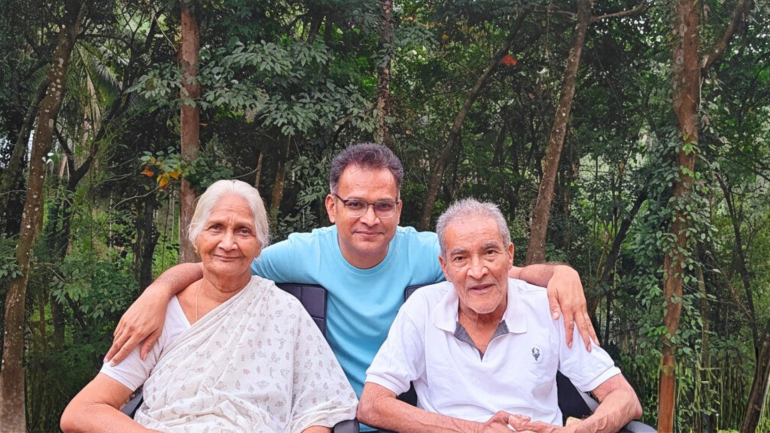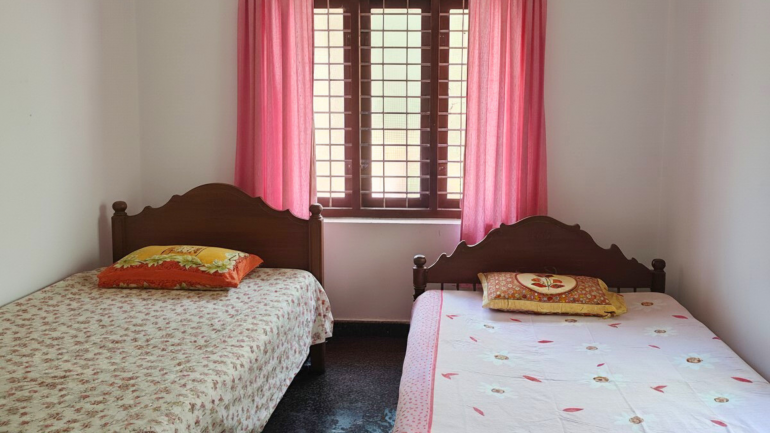“I felt truly and totally orphaned”

(In this “November Special Series,” RVA’s writers share memories of loved ones they have lost, a celebration of their lives, recalled with a tinge of sadness and the hope that one day there will be a reunion…… in a place where there is no death, no suffering, and where God Himself will wipe away every tear. – Editor)
I lost both my parents in 2024, when they were in their mid-eighties. My mother passed away in April after a fierce second battle with cancer. My father followed her on the last day of the year, succumbing to many complications due to old age. On New Year’s Day 2025, we laid him to rest beside her in our family grave in our parish cemetery in Kerala.
That evening, after returning from the cemetery, I sat for a while in my parents’ vacant bedroom, overwhelmed by a profound sense of being truly and completely orphaned. The year 2024 had finally brought me face to face with a moment I had long dreaded and deliberately avoided contemplating, even in my mid-fifties: the moment when I would lose both my parents and feel alone.
Three and a half decades ago, when I left home to become a Jesuit priest, I had, in some sense, already begun to lose the idea of home. Each time I returned to what had once been my home, the affection and presence of my parents and siblings rekindled that lost sense of home and belonging.
But as my siblings grew up, built their own families, and my parents aged gracefully into their later years, surrounded by the life and laughter of grandchildren that filled the house, I gradually became an occasional visitor, the ‘son, brother, brother-in-law, and uncle’ who came home once in a while, stayed for a while, and left. And when my parents departed, that quiet sense of homelessness, once faint and familiar, deepened into something far more final.

On the evening of January 1, 2025, as I sat in their empty bedroom, surrounded by the silence that had replaced their voices, I felt the full weight of their loss. The fragile sense of home that had always waited, where I was simply their son before I was a priest, was gone. I belonged, as a priest is meant to, to the larger world, to everyone, and yet, in that crushing silence, I belonged to no one at all. From now on, for me, there is no longer a son going home.
When I returned to this now-parentless home last October, I tried to avoid the room that had once been my parents’ bedroom. Dwelling on this avoidance, I recognised my deep-seated need and desire to cling to my parents, despite knowing that they had lived to a ripe old age, had led full and happy days, were cared for and loved deeply, and had departed in the presence of their devoted children and grandchildren.
Perhaps this longing to hold on to them is my unspoken need to belong, to possess, to feel significant, to be loved, and, in some quiet way, to resist the inevitable truth of human existence, mortality.
There is nothing more certain in life than our mortality. Human life is alarmingly brief. I wonder if this haunting awareness of the brevity of earthly life made the psalmist pray, “Teach us to number our days, that we may gain a heart of wisdom” (Psalm 90:12). Wisdom, it seems, is born of the awareness that life is fragile and fleeting, and that eternity, in whatever form, and not ephemeral earthly time, is our true horizon.

Every believer in life beyond death professes that our earthly existence is only a preparation for the perfect and eternal life that awaits beyond the grave. St. Paul echoes this hope when he says, “Here we have no lasting city, but we are looking for the city that is to come” (Hebrews 13:14).
And yet, I am afraid, in every believer there lingers an unbeliever, longing to postpone the perfect and the eternal for as long as possible. I recall both my parents earnestly wanting to postpone the inevitable, just as we, their children, longed to have them with us a little longer, despite our professed faith in the promise of “an inheritance that is imperishable, undefiled, and unfading” (1 Peter 1:4).
Is it unbelief that makes us cling so desperately to the fleeting life on earth? Have we perhaps reduced St. Paul’s triumphant assurance — “Christ has indeed been raised from the dead, the first fruits of those who have fallen asleep… For as in Adam all die, so in Christ all will be made alive” (1 Corinthians 15:20–22), to nothing more than a consoling statement for the bereaved, rather than a conviction that shapes the way we live and die?
Or is it love, that profound human longing to belong, to remain tethered to all that we cherish, even when we must let it go? It is a common experience that every parent rejoices to see their children leave home for better education, career, or vocation, yet when they leave, the parents grieve. They delight in seeing their daughters happily married and settled, yet when those daughters leave home with the love of their hearts, the parents grieve still.
In much the same way, we, who believe in the promise of eternal life, grieve when our loved ones depart, not because we doubt the promise, but because love cannot simply cease at the threshold of eternity. Like the loving parents who rejoice even as they grieve, we too hold sorrow and hope together.
Faith does not erase grief, nor does hope dissolve longing. Rather, in their union, we glimpse the mystery of love, a love that transcends death while bearing the full weight of human loss. For as Jesus himself promised, “I will not leave you orphaned; I am coming to you” (John 14:18). That promise, whispered into the depths of our sorrow, transforms our sense of orphanhood into belonging, not to the homes we have lost, but to the eternal communion of love that never ends.
In time, I have come to see that grief is not merely the price of love, but its continuation in another form, a silent, enduring dialogue between memory and absence. The absent presence of my parents lingers in the quiet recesses of my mind: in the tenderness of cherished memories, the warmth of a remembered embrace, the images of tears shed at parting, the cadence of a whispered prayer, the echo of their wisdom in my choices. The home that once belonged to them has changed, yet in its emptiness, it beckons me to a deeper dwelling, not of walls or time, but of love that endures beyond both.
Let us know how you feel!
Comments
You have summed up grief so personally and so universally. Your expressions are simply realistic and touching. I feel so blessed to have my 86 year old mother with me, so I can look after her and talk to her.
Thank you for the reminder about death and absence.
May God bless you.
Mini










This is such a beautiful tribute to your really good looking parents.
My parents have always been the pillars of our family especially my mom. We will be nothing without her.
May God bless you always Father.
- Reply
Permalink